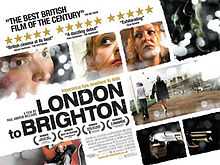London to Brighton
| London to Brighton | |
|---|---|
 | |
| Directed by | Paul Andrew Williams |
| Produced by | Wellington Films |
| Written by | Paul Andrew Williams |
| Starring |
Lorraine Stanley Georgia Groome Johnny Harris Sam Spruell Chloe Bale Alexander Morton |
| Music by | Laura Rossi |
| Running time | 85 mins |
| Country | United Kingdom |
| Language | English |
London to Brighton is a 2006 award-winning British film.[1] The film was written and directed by Paul Andrew Williams.
Plot
The film opens with a woman and child, Kelly and Joanne, bursting into a London toilet. Joanne is crying and Kelly has a black eye. Eventually Kelly gets them on a train to Brighton, and it is clear they are running from someone.
Joanne is an eleven-year-old runaway who is procured by a reluctant Kelly into having sex with an old violent mobster with a taste for underage girls. Kelly's pimp, Derek, bullies her into complying, but it all goes horribly wrong, and the old mobster is killed, presumably by one of the girls. The older man's son, Stuart, then forces Derek to find the girls. The film follows the duo's flight from London in the wake of what has happened.
Arriving initially in Brighton, Kelly visits her friend Karen and tries to earn enough money through prostituting herself to help Joanne afford the train to Devon, where the child's grandmother lives. The two are eventually tracked down by her pimp and his associate and taken to meet Stuart at a secluded field. Upon arrival, Kelly's pimp and associate are made to dig two graves, presumably for the girls. However, Stuart decides that the girls are the victims in this episode and decides instead to kill Kelly's pimp and associate. The film ends with Kelly and Joanne arriving at Joanne's grandma's house in Devon. Kelly watches from a distance as the girl and the grandmother hug, then turns away.
Cultural references
- The film is seen as belonging to the crime-thriller genre, but it also plays on the idea of social realism with the themes of child prostitution and the runaway youth.
Main cast
- Lorraine Stanley as Kelly
- Georgia Groome as Joanne
- Sam Spruell as Stuart Allen
- Alexander Morton as Duncan Allen
- Johnny Harris as Derek
- Chloe Bale as Karen
- Nathan Constance as Chum
Critical reception
The film received mostly very positive reviews from critics. The British magazine produced for homeless people, The Big Issue, called it "The best British film of the century,"[2] while The Guardian dubbed it "the best British film of the year."[3]
In July 2008, the review aggregator Rotten Tomatoes reported that 69% of critics gave the film positive reviews, based on 22 reviews.[4] Metacritic reported the film had an average score of 55 out of 100, based on 7 reviews.[5]
Awards and nominations
The film won a British Independent Film Award for Best Achievement in Production. The director also won several awards at various film festivals. Paul Andrew Williams won the Golden Hitchcock award at the Dinard Festival of British Cinema, the New Director's Award at the Edinburgh International Film Festival, Best Feature Film at the Foyle Film Festival, and a Jury Prize at the Raindance Film Festival.[1]
References
- ↑ 1.0 1.1 Awards for London to Brighton (2006) IMDb.com
- ↑ "London to Brighton (2008): Reviews". UK Screen. Retrieved 1 January 2009.
- ↑ "Review - London to Brighton". The Guardian. 1 December 2006. Retrieved 4 April 2011.
- ↑ "London to Brighton - Movie Reviews, Trailers, Pictures". Rotten Tomatoes. Retrieved 8 February 2008.
- ↑ "London to Brighton (2008): Reviews". Metacritic. Retrieved 8 February 2008.
External links
- London to Brighton
- London to Brighton at the Internet Movie Database
- London to Brighton at Rotten Tomatoes
- London to Brighton at Metacritic
- London to Brighton at allmovie
- DVD review - London to Brighton guardian.co.uk, 30 April 2007
- London to Brighton Times Online, 30 November 2006
- London To Brighton (2006) BBC - Movies, 24 November 2006
- London to Brighton (2006) Timeout London, 29 November 2006
- London to Brighton - Trailer YouTube
- Vidiyum Munn Vidiyum Munn - Tamil Movie - Inspired by London to Brighton
Publications
- Stella Hockenhull, "An Aesthetic Approach to Contemporary British Social Realism: London to Brighton", Film and Romantic special issue, Jeffrey Crouse (ed.), Film International, Vol. 7, No. 6, December 2009
| |||||